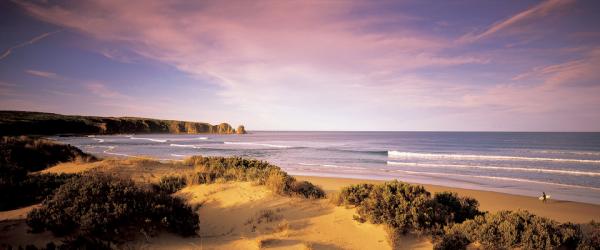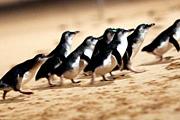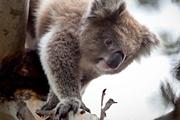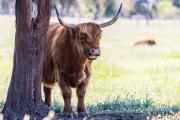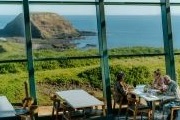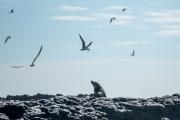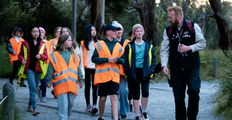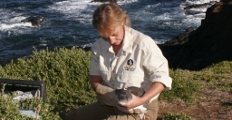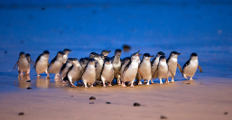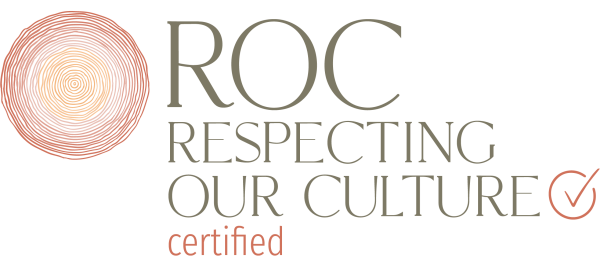-
What is Ecotourism?
-
ROC Program
-
Climate Change and the Nature Parks
-
Responsible Traveller Information
What is Ecotourism:Phillip Island Nature Parks is an advanced ecotourism destination. "Ecotourism is ecologically sustainable tourism with a primary focus on experiencing natural areas that fosters environmental and cultural understanding, appreciation and conservation." Further information about ecotourism can be found at: ecotourism.org.au. The Nature Parks is proud to provide Ecotourism certified programming and rangers. Phillip Island Nature Parks has been honoured with entry into the Ecotourism Australia Hall of Fame for being continuously eco-certified for 20 years. |
|
|
Our Vision: A place where conservation and ecotourism excellence inspire people to actively protect the environment. |
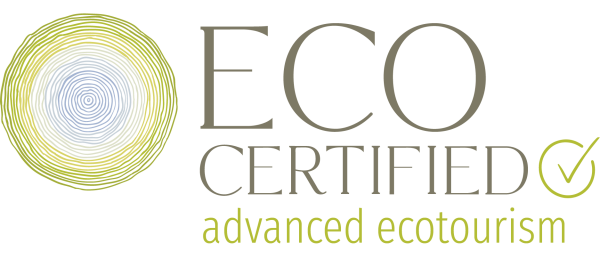 |
Respecting Our CultureThe Respecting Our Culture (ROC) program encourages the tourism industry to operate in ways that respect and reinforce Aboriginal and Torres Strait Islander cultural heritage and the living cultures of Aboriginal and Torres Strait Islander communities. ROC certified tourism operators are committed to protecting cultural authenticity and integrity, developing sound business practices, environmental protection and acknowledging Aboriginal and Torres Strait Islander Peoples spiritual connection to the land and water. For more information see our Reconcilliation Action Plan.
|
|||
Women jeka to Milawul (Welcome to Phillip Island)
The Nature Parks is privileged to manage the Crown Land that forms part of the traditional lands of the Bunurong and acknowledges that the Land, Waters and Sea are of spiritual, cultural and economic importance to Aboriginal and Torres Strait Islander Peoples. We walk together, side by side, respectfully caring for the Country, Waters and Sea of Milawul. We create a shared future of recognition, opportunity and true partnerships with Traditional Owners and Aboriginal and Torres Strait Islander Peoples. We create opportunities for healing through responsible and respectful truth telling and knowledge sharing.

We demonstrate respect by:
- Proudly flying the Aboriginal and Torres Strait Islander flags at our sites and Acknowledgement of Country stickers on public and staff doors.
- Providing a Welcome to Country by Traditional Owners at all major events.
- Providing an Acknowledgement of Country at meetings, on tours, at attractions for visitors and on documents and website.
- Coming together to commemorate and celebrate Sorry Day, National Reconcilliation Week, and NAIDOC Week.
- We are committed to the authentic process of sourcing and delivering Aboriginal and Torres Strait Islander information through agreed Working Together protocols.
- Inclusion of our commitment to reconciliation in our staff induction process.
- Cultural awareness training delivered by Traditional Owners and Aboriginal and Torres Strait Islander Community members for our Board, Managers, Staff and Volunteers.
- Regular RAP information updates to Board, Staff and Community stakeholders.
- Consultation with Traditional Owners to incorporate approved language into interpretative displays, education programs, tours, and general communications.
- Maintaining Respect Our Culture (ROC) Certification for our organisation through Ecotourism Australia.
- Working with Bunurong Land Council as the Registered Aboriginal Party, Traditional Owners and Community on numerous projects in our RAP.
- Conducting Cultural Heritage Management Plans and reviewing our compliance with Heritage legislation requirements.
- Holding On Country meetings with our Board to discuss our RAP achievements and objectives.
When visiting Milawul, you can demonstrate respect by:
- Respecting the Country, Waters and Sea of Milawul.
- Being aware of Bunurong Language that you may hear during your visit - terms such as Women jeka (Welcome), Milawul (Phillip Island), and Bunjil (Wedge-Tailed Eagle) who is the father creator of the Bunurong Peoples.
- Sticking to pathways and tracks. Many of our walkways are purposefully placed to avoid sites of natural and cultural significance such as archeological sites including middens. Staying on the tracks will help minimise disturbance of these significant sites.
- Not removing any natural materials, e.g. shells on beaches as these items may be an artefact or part of a significant site such as a midden.
- If you interact with an Aboriginal and Torres Strait Islander Person and want to take their photo, please make sure you ask for their permission as this can be considered disrespectful behaviour.

Climate Change and the Nature Parks
As many natural areas around the world are starting to show the impacts of climate change, places such as Phillip Island (Milawul) are being acknowledged as providing a haven for flora and fauna.

"Victoria is blessed with unique environments, and plants and animals in their natural habitat. Phillip Island is an important environment showcasing Victoria’s biodiversity, providing a haven for unique wildlife that is admired by visitors from around the world. Phillip Island Nature Parks has demonstrated excellent conservation outcomes over the past decades including the restoration of the Summerland Peninsula, achieving fox free status and supporting the re-establishment of critically endangered Eastern barred bandicoots into the wild. Despite this, Phillip Island’s environment faces major future challenges including adapting to climate change, controlling the effects of a growing population and maintaining the wild populations of land and marine animals and plants amidst increased development pressure and the effects of pollution."
- Lily D’Ambrosio MP, former Minister for Energy, Environment and Climate Change

The Phillip Island Nature Parks has created and is involved in a wide range of initiatives and projects to help build resilience to climate change on Phillip Island. Explore the links below to find out more about this valuable work!
For latest publications and management plans please click here
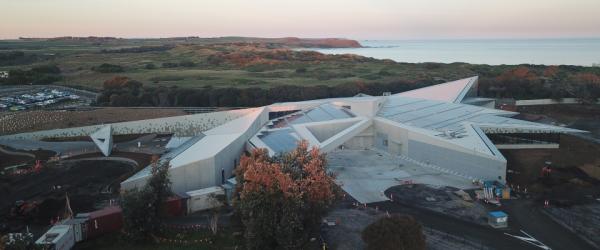
Penguin Parade Visitor Centre
Premier Daniel Andrews joined Minister for Environment, Energy and Climate Change Lily D’Ambrosio and local Member for Bass Jordan Crugnale to launch the award-winning facility on Thursday, 25 July 2019 replacing the existing centre built more than 30 years ago. The centre’s overall environmental credentials are impressive, with an array of 666 solar panels on the expansive roof, a water filtration system to recycle rainwater for non-potable use, increased roof and floor insulation, and double-glazed windows. Low carbon building materials have been used throughout the centre’s construction, including sustainably sourced Victorian Ash hardwood for the impressive laminated beams.

Barb Martin Bushbank
With habitat disappearing at an alarming rate, you can help provide wildlife with an oasis of habitat they need to thrive. The native plants that you use can meet the needs of native wildlife without causing long-term damage to local plant communities.
Bins on Boats
Phillip Island Nature Parks, in partnership with the commercial fishing sector has provided 100 specially built bins to collect rubbish and net fragments onboard Victorian commercial fishing vessels in an effort to reduce marine pollution and save lives of wildlife.
As climate heats up, artificial burrows could help penguins stay cool
In collaboration with La Trobe University, the Nature Parks is testing 50 artificial burrows, in five different designs, to better protect penguins during extreme hot weather, which is more likely because of climate change. These include burrows with pitched roofs, small chimneys and elevated ceilings.
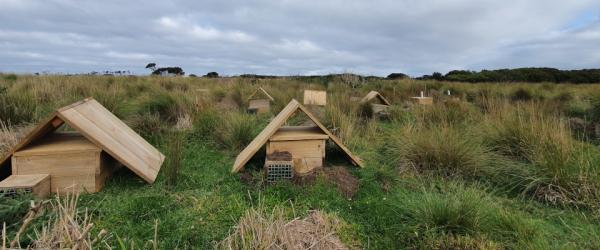
Responsible Traveller Tips
When visiting the Nature Parks
- Bring a refillable water bottle! Our sites have free-of-charge bottle filling stations.
- Bring a keep cup! Bring your own keep cup and receive a discount at our cafés.
- Stay on the tracks! When walking through our beaches and reserves keep in mind these paths often travel through vulnerable habitat. Stepping off the path for that perfect selfie may result in crushed burrows for our little penguins or short-tailed shearwaters.
- Take only photographs, leave only footprints! Searching for treasures on our beaches and in our woodlands is a great way to explore our island but remember all these pieces are food and habitat for our wildlife. Take all your rubbish and belongings with you when you leave, and if you find someone else's rubbish Take 3 for the Sea.
- Don't feed the wildlife! We know seagulls love your leftover chips, but chips are not a part of a seagull's natural diet. Our wildlife is wild and are healthiest and happiest feeding themselves.
- Be respectful on Bunjil Country! Bunjil asks that visitors to Bunurong Country agree to the laws and not harm the land, the waterways or any of Bunjil's children.
